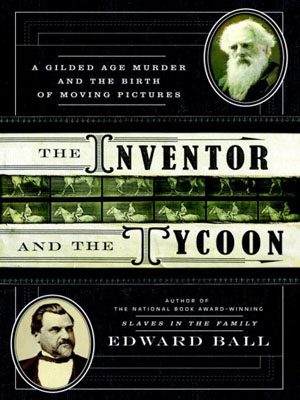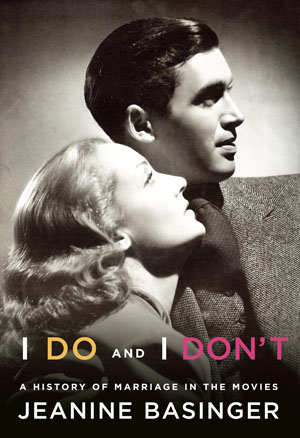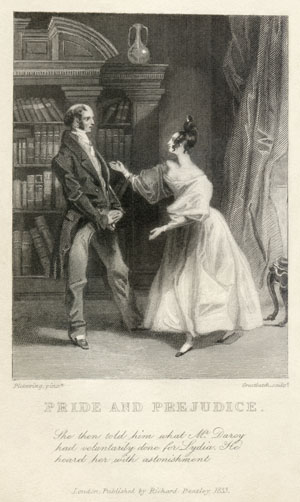We follow up today’s entry on Lawrence Wright’s Going Clear with a round on other recently published books, but let’s note first that David Bordwell has written up a batch of “books that fate and friends have sent my way…. All are worth your attention, in whatever format you can get them.”
For the New York Times Book Review, Candice Millard takes on what looks to be a fascinating read (she calls it “engrossing”), Edward Ball’s The Inventor and the Tycoon: A Gilded Age Murder and the Birth of Moving Pictures. The tycoon is railroad magnate Leland Stanford and the inventor is none other than Eadweard Muybridge: “At the height of his genius, Muybridge, a British immigrant whose stunning advancements in photography in the mid-to-late 1800s astonished the world and gave rise to the motion picture industry, looked and generally lived like a vagabond. He dressed in clothing so tattered that his uncombed, usually unwashed, hair poked out of holes in his hat, and his pants threatened to fall off in pieces as he walked. He ate cheese flies, tiny insects that hover around the tops of old cheese and that he used to gather up into packages and snack on as he brooded over his photographs. Then there was the small matter of the murder.”
John Barker for 3:AM on Guy Debord’s The Game of War: “This 80 page book by Richard Barbrook and Fabian Thompsett is an extension of the film script that forms the basis of Ilze Black’s film of the same name. It describes how a group was formed to popularize and play the Game of War which Guy Debord spent the last 10 years of his life developing and playing with Alice Becker-Ho. It lists the various public venues where the group has played the game in real time, but also describes the game in detail and hints at why they think it is important. The first, unstated, is to rescue Debord, long term member and survivor of the Situationist International (SI), from the ironic recuperation of him and the SI by the cultural establishment they despised.”
At the House Next Door, Clayton Dillard finds L. Andrew Cooper’s Dario Argento “torn between its academic and populist inclinations. Unlike Maitland McDonagh’s revelatory Broken Mirrors/Broken Minds: The Dark Dreams of Dario Argento, which strikes an invigorating balance of analysis, theory, and historicizing, Cooper states from the onset his desire to ‘eschew a traditional auteur approach.’ Necessarily, this leads him down a rather predictable post-structuralist path…”
As for Jeanine Basinger‘s I Do and I Don’t: A History of Marriage in the Movies, Dillard “cannot help but be enveloped by the 139 stills and illustrations that so vividly render” Hollywood’s classic era. “Rather than historicizing with a revisionist eye, Basinger takes a more traditional historical approach, placing film after film within different or overlapping taxonomies. Much like fellow film historian David Bordwell, her writing is strong, the vision clear, but the parade through periods and themes of filmmaking is more soporific than enlivening, since the categorizations read as matter of fact, instead of being motivated by reaching audacious ends.” Still: “If Basinger’s methodological means lack revelation, they’re compensated through several canny observations, mostly related to on-screen personas.” More on that one from Susan King in the Los Angeles Times; Salon‘s running an excerpt.
The New York Review of Books is celebrating its 50th anniversary this month, and the new issue, just out, features two pieces up our alley. Sean Wilentz outlines in detail the ways that the sourcing Oliver Stone and Peter Kuznick do in their book and television series The Untold History of the United States “recalls nothing so much as Dick Cheney’s cherry-picking of intelligence.” And Lorrie Moore addresses the “main problem” with one of the President’s favorite shows, Homeland. For those looking to cut to the chase, it’s the love story.
Meantime, just up at the NYRBlog, from none other than Michael Chabon: “From Rushmore to Moonrise Kingdom (shamefully neglected by this year’s Academy voters), Wes Anderson’s films readily, even eagerly, concede the ‘miniature’ quality of the worlds he builds, in their set design and camera-work, in their use of stop-motion, maps, and models. And yet these miniatures span continents and decades. They comprise crime, adultery, brutality, suicide, the death of a parent, the drowning of a child, moments of profound joy and transcendence.”
In the Los Angeles Review of Books, Richard Kramer remembers a mentor and a friend, Pauline Kael: “‘Oh shit,’ she said. ‘You’re just a baby. Come on in.’ She laughed.The first time I would hear that laugh—musical, rangy, a broad’s laugh, a laugh that welcomed you even as it warned you that once you stepped through that door, you were expected to join her in her merry fuck-you to all bullshit, bluster, and begging-for-Oscars ‘worthiness.'”
Also in the LARB, Patrick Jagoda reviews Alexander R. Galloway‘s The Interface Effect, which…
aspires to be not only a theory of interfaces but also a broader rethinking of the field of “new media studies,” an academic discipline with precursors in the media theories of Marshall McLuhan and Raymond Williams in the 1960s that emerged properly with scholarship produced alongside the rise of web culture of the 1990s. In recent years, new media scholars have focused on topics such as software (Lev Manovich, Matthew Fuller), hardware (Friedrich Kittler, Wendy Hui Kyong Chun), new forms of social interaction (Geert Lovink, Sherry Turkle), information networks (Tiziana Terranova, Eugene Thacker), digital technologies and human affects (Mark Hansen, Jodi Dean), development platforms (Ian Bogost, Nick Montfort), and the emergence of electronic literature and new digital art forms (Katherine Hayles, Henry Jenkins). Galloway has made important contributions to a number of these conversations with previous books about the politics of code and digital media (Protocol), computer networks (The Exploit, cowritten with Thacker), and videogames (Gaming). The Interface Effect returns to all of these areas while also analyzing other topics, such as the relationship between software and ideology, the aesthetics of information visualizations, and the “gold farming” phenomenon that has influenced the cultures of massively multiplayer online games.
“Jeff Bridges and Bernie Glassman, both Buddhists, are extremely good people, although only one of them has an Oscar,” writes Choire Sicha for Bookforum. “They met, sure, in LA. ‘I met Bernie at a dinner thrown by a neighbor of mine for him and Ram Dass,’ says Bridges, and then much later Bernie thought they should write a book about how Bridges’s character of the Dude, from The Big Lebowski, was a very Buddhist fellow, and Jeff Bridges was like, ‘OK, great,’ and they ‘went up to my ranch in Montana’ and ‘jammed for five days’ while some guy named Alan took photographs of them and recorded their dialogue. Then Bernie’s wife dealt with the transcripts. (So it has ever been.) The result is The Dude and the Zen Master, a book of ‘jamming’ dialogue, a tremendously harmless, good-natured pile of mindlessness.”
Mary Hawthorne for the New Yorker on The Richard Burton Diaries: “In these pages—which Burton began when he was fourteen and continued until the year before his death—he strips away the larger-than-life abstraction that he became for the public to reveal a human dimension more complex than any biographer could ever hope to capture. He is sensitive, intelligent, literary, outwardly and inwardly curious, tender, sometimes boorish and spiteful but conscious of fair play, wickedly discerning and funny, surprisingly modest, wildly generous, a delightful gossip, and virtually never boring—something that would have frightened and appalled him.”
Vince Keenan recommends the Jack LeVine Trilogy: “If Andrew Bergman had only written The In-Laws, one of the funniest movies ever made (‘Serpentine!’), he’d be enshrined in my personal pantheon. His original screenplay Tex X spawned Blazing Saddles, he adapted Gregory Mcdonald’s Fletch, and as writer/director he’s responsible for the crackpot genius that is The Freshman. Before going Hollywood, Bergman—a fellow proud son of Queens—studied Hollywood, penning a study of Depression era films. He also wrote a series of period detective novels that Mysterious Press has reissued as ebooks. I’d heard about them. I had no idea I was missing them.”
And finally for now, as you’ll have heard, Pride and Prejudice turned 200 last week, and, as the NYT‘s Jennifer Schuessler reports, Jane Austen fans are going to be celebrating all year-long. The BBC examines the “curious American cult of Jane Austen,” the Telegraph posts stills from various adaptations, but John Wyver betters the paper with an annotated set of twelve clips. For more on the anniversary, see Audrey Bilger and Susan Celia Greenfield (LARB), Paula Byrne (LARB), William Deresiewicz (New Yorker), Devoney Looser (LARB), Rebecca Mead (New Yorker), and Jillian Steinhauer (Hyperallergic).
For news and tips throughout the day every day, follow @KeyframeDaily on Twitter and/or the RSS feed. Get Keyframe Daily in your inbox by signing in at fandor.com/daily.






